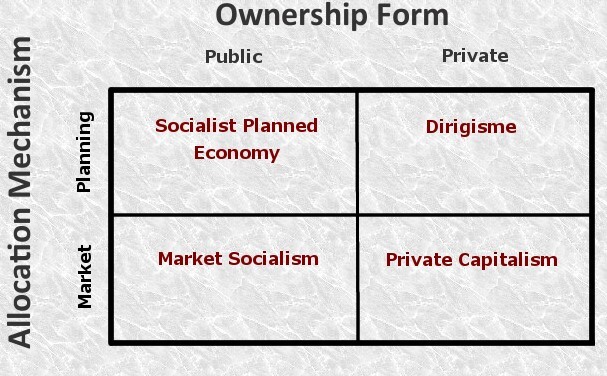
 Data Structure
Data Structure Networking
Networking RDBMS
RDBMS Operating System
Operating System Java
Java MS Excel
MS Excel iOS
iOS HTML
HTML CSS
CSS Android
Android Python
Python C Programming
C Programming C++
C++ C#
C# MongoDB
MongoDB MySQL
MySQL Javascript
Javascript PHP
PHP
- Selected Reading
- UPSC IAS Exams Notes
- Developer's Best Practices
- Questions and Answers
- Effective Resume Writing
- HR Interview Questions
- Computer Glossary
- Who is Who
Meaning and Types of Economic System
Meaning of Economic System

An economic system is the set of regulations that governments or societies exert to control and distribute various resources, goods, services, etc. in a given geographical location or a country. Economic systems have defined uses of economic resources, land, labor, capital, and physical resources, such as machinery and technology.
An economic system is a complex structure containing various agencies, entities, governing bodies, and economic resources. There are numerous types of economic systems depending on the nature of control of the economy. Therefore, economic systems are the establishments that show the actual nature of the economy of a country.
Types of Economic Systems
There are numerous types of economic systems in the world. However, there are some relatable trends depending on which economies can be divided into four major types. These are as listed below.
Traditional Economic System
Traditional economy is the most ancient and simplest type of economy wherein such economies are mostly found in second or third-world countries, people are mostly engaged in farming or other simple income-generating activities.
The traditional economy relies on goods, services, and work patterns that follow a certain condition. The division of labor and therefore, specialization is very nominal in traditional economies.
Communities in traditional economies are more inclined towards activities like farming, fishing, and other such activities.
In traditional economic communities, there are very few resources to share among individuals. Some of these resources are available naturally and some are restricted to certain groups of people. Therefore, traditional economies usually do not produce a surplus.
However, since traditional means are used in most of the work, these are the most sustainable form of economy. Moreover, as there is only a little output, the amount of waste of resources in the traditional systems is lower than in all other forms.
Command Economic System
In a command economic system, there is a centralized governing authority which is usually the government. Command economies are generally socialist economies in which the government controls the resources and regulates the laws. This system of the economy does not offer businesses or production houses a grip on the economy.
In most of the command economy cases, governments own the most precious resources, such as gold or oil, and let others control other resources, such as agriculture.
Command economic systems are also known as planned systems where the decisions about society are largely controlled by the government. When there are many resources available in an economy, chances are that it is a command economy.
There is hardly any room for private players to exert their influence in a command economy because everything is under the control of the government.
The command economy can be a very attractive option for people when the government works according to the best interest of the general population. However, in general, that is not the case. Command economies are very rigid in nature where enough time is taken by governments to take a decision that is mostly influenced by political interests.
Market economy
A market economy or free market economy is an economic system where private entities are allowed to produce most of the resources. There is usually little interference from the government in economic and business activities taking place in a market economy.
The market economy is regulated by demand and supply and hence the control of the economy is in the hands of the people of the economy. Therefore, businesses in a market economy must work in the best interests of the people.
Although considered very growth-oriented, as maximum growth is possible in this economic system, a pure market economy only exists in theory. In the case of the real world, most economies have government interventions in sensitive and important segments of the economy.
The growth of economies is the highest in market economies. However, in market economies, private players may amass a lot of economic resources. Those market players that offer a solution of value can gain substantial control over the economy.
Moreover, the distribution of resources is not equitable in the case of the market economy. This is so because the entities that succeed economically tend to control most of them.
Mixed Economic System
The mixed economic system is a combination of command and free market economy. Here, private players may control the resources of the economy but the governments also have considerable intervention in numerous issues.
The mixed system is prevalent in many western economies where most industries are private but the public service systems come under government purview. Therefore, it can be inferred that government controls most of the decisions that impact society while business decisions are left to the hands of private entities.
Mixed systems are now the trend globally. In general, it is considered that mixed systems combine the best features of both command and market economies. However, this is not the case in reality. Governments tend to exert more pressure on private entities in mixed economic systems.
Key Takeaways
An economic system is the set of regulations that governments or societies exert to control and distribute various resources, goods, services, etc. in a given geographical location or a country.
There are some relatable trends depending on which economies can be divided into four major types. These are traditional, command, market, and mixed economies.
Traditional economy is the most ancient and simplest type of economy. In such economies that are mostly found in second or third-world countries, people are mostly engaged in farming or other simple income-generating activities.
In a command economic system, there is a centralized governing authority which is usually the government.
A market economy or free market economy is an economic system where private entities are allowed to produce most of the resources. There is usually little interference from the government in economic and business activities taking place in a market economy.
The mixed economic system is a combination of command and free market economy. Here, private players may control the resources of the economy but the governments also have considerable intervention in numerous issues.
Conclusion
It is important for one interested in economics to learn about economic systems because these are the systems that define the nature of the economy in a given country. Although most nations follow mixed economies, it is worthwhile to study all three other types of economies.
FAQs
Qns 1. What is meant by economic systems? Discuss briefly.
Ans. Economic systems or economies are means by which societies or governments control services, goods, and resources in a country.
Qns 2. In how many types can the economies of the world be divide?
Ans. There are numerous types of economic systems in the world. However, there are some relatable trends depending on which economies can be divided into four major types. These are traditional, command, market, and mixed economies.
Qns 3. Which economic system is a mix of command and free market economies?
Ans. The mixed economy is a combination of command and free market economies.

